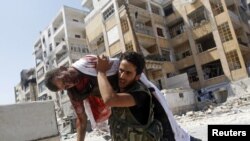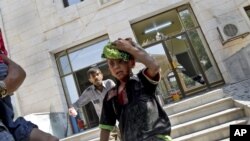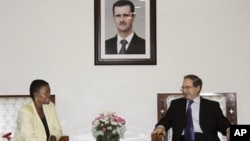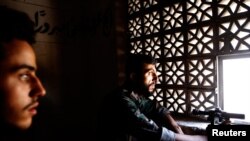A day after a bombing near the U.N. observer headquarters in Damascus, the United Nations Security Council decided to end the U.N. monitoring mission in Syria when its mandate expires on Sunday.
“The mandate of UNSMIS is over,” French U.N. Ambassador Gerard Araud told reporters after the decision. The U.N. envoy from Russia, a chief Syria ally, said the Kremlin regrets the decision and will continue to push for a diplomatic solution to the near 18-month-long uprising in Syria.
Thursday's Security Council session follows a Syrian warplane attack on Wednesday in the rebel-controlled northern town of Azaz, where more than 40 civilians were reported killed and more than 100 others wounded.
VOA correspondent Scott Bobb was in Azaz during the aerial attack and saw many casualties. Hospitals in nearby Turkey were overwhelmed by wounded Syrians, many of whom had lost limbs.
Human Rights Watch monitors visiting Azaz Thursday said the attack leveled a block of houses. They said Syrian government forces may have been targeting two nearby facilities of the rebel Free Syrian Army.
"This horrific attack killed and wounded scores of civilians and destroyed a whole residential block," the group's acting emergencies director, Anna Neistat, said. "Yet again, Syrian government forces attacked with callous disregard for civilian life."
U.N. seeks more funding
The U.N. humanitarian chief, Valerie Amos, is calling for more funding to help as many as 2.5 million people in need of aid in the violence-torn nation.
Amos told reporters in the Syrian capital Thursday that fighting in the nearly 18-month uprising against President Bashar al-Assad has become more intense. She said the humanitarian situation in Syria has worsened since she last visited in March.
"Over a million people have been uprooted and face destitution," Amos said in Damascus. "Perhaps a million more have urgent humanitarian needs due to the widening impact of the crisis on the economy and on people's livelihoods. Back in March, we estimated that a million people were in need of help. Now as many as 2.5 million are in need of assistance, and we are working to update our plans and our funding requirements."
Amos said the aid that the U.N. and its partners are currently providing only partially meets the nation's needs. She appealed to the international community to "contribute more generously" and said she will continue to urge the Syrian government to ease restrictions on aid groups.
"I continue to lobby the government to be more flexible in its approach to humanitarian operations," she said. "There is no reason why ordinary Syrians - men, women and children - should not receive as much help as is practically possible."
U.N. investigators said Wednesday the Syrian government and their militia allies have committed war crimes that include the killing and torturing of civilians.
The investigators said rebel forces have also committed war crimes, but that these crimes "did not reach the gravity, frequency and scale" of those committed by the government.'
Assad losing support
Meanwhile, the 57-nation Organization of Islamic Cooperation (OIC) on Thursday suspended Syria's membership because of the government's crackdown on dissent and opposition rebels.
The French news agency says the bloc expressed "deep concern at the massacres and inhuman acts suffered by the Syrian people."
The United States commended the OIC for the suspension. In a statement after the move, State Department spokeswoman Victoria Nuland said the decision sends a "strong message" to President Assad's government.
"Today's action underscores the Assad regime's international isolation and the widespread support for the Syrian people and their struggle for a democratic state that represents their aspirations and respects their human rights," she said.
International divisions
The Syrian government continues to rely on allies Russia and China to blunt growing international calls for Assad to resign.
Syrian envoy Bouthaina Shaaban has praised China and Russia for their response to the crisis in Syria, saying that unlike the West, those countries are not acting like "colonizers."
"We're happy to see countries like China and Russia, who are not colonizers or deal with people as colonizers,'' Shaaban said in an interview. She called that "a very different stance from the West."
Shaaban's comments appeared Thursday in the state-run China Daily newspaper. The adviser to Assad is due to meet with Chinese Foreign Minister Yang Jiechi.
China and Russia have both vetoed three U.N. Security Council resolutions threatening Syria with sanctions for using heavy weapons against civilians.
Syrian activists say more than 20,000 people have been killed since the start of the uprising in March of last year.
Photo Gallery: Latest Images from Syria
Related Video report by Scott Bobb
Timeline of Syria Conflict
“The mandate of UNSMIS is over,” French U.N. Ambassador Gerard Araud told reporters after the decision. The U.N. envoy from Russia, a chief Syria ally, said the Kremlin regrets the decision and will continue to push for a diplomatic solution to the near 18-month-long uprising in Syria.
Thursday's Security Council session follows a Syrian warplane attack on Wednesday in the rebel-controlled northern town of Azaz, where more than 40 civilians were reported killed and more than 100 others wounded.
VOA correspondent Scott Bobb was in Azaz during the aerial attack and saw many casualties. Hospitals in nearby Turkey were overwhelmed by wounded Syrians, many of whom had lost limbs.
Human Rights Watch monitors visiting Azaz Thursday said the attack leveled a block of houses. They said Syrian government forces may have been targeting two nearby facilities of the rebel Free Syrian Army.
"This horrific attack killed and wounded scores of civilians and destroyed a whole residential block," the group's acting emergencies director, Anna Neistat, said. "Yet again, Syrian government forces attacked with callous disregard for civilian life."
U.N. seeks more funding
The U.N. humanitarian chief, Valerie Amos, is calling for more funding to help as many as 2.5 million people in need of aid in the violence-torn nation.
Amos told reporters in the Syrian capital Thursday that fighting in the nearly 18-month uprising against President Bashar al-Assad has become more intense. She said the humanitarian situation in Syria has worsened since she last visited in March.
"Over a million people have been uprooted and face destitution," Amos said in Damascus. "Perhaps a million more have urgent humanitarian needs due to the widening impact of the crisis on the economy and on people's livelihoods. Back in March, we estimated that a million people were in need of help. Now as many as 2.5 million are in need of assistance, and we are working to update our plans and our funding requirements."
Amos said the aid that the U.N. and its partners are currently providing only partially meets the nation's needs. She appealed to the international community to "contribute more generously" and said she will continue to urge the Syrian government to ease restrictions on aid groups.
"I continue to lobby the government to be more flexible in its approach to humanitarian operations," she said. "There is no reason why ordinary Syrians - men, women and children - should not receive as much help as is practically possible."
U.N. investigators said Wednesday the Syrian government and their militia allies have committed war crimes that include the killing and torturing of civilians.
The investigators said rebel forces have also committed war crimes, but that these crimes "did not reach the gravity, frequency and scale" of those committed by the government.'
Assad losing support
Meanwhile, the 57-nation Organization of Islamic Cooperation (OIC) on Thursday suspended Syria's membership because of the government's crackdown on dissent and opposition rebels.
The French news agency says the bloc expressed "deep concern at the massacres and inhuman acts suffered by the Syrian people."
The United States commended the OIC for the suspension. In a statement after the move, State Department spokeswoman Victoria Nuland said the decision sends a "strong message" to President Assad's government.
"Today's action underscores the Assad regime's international isolation and the widespread support for the Syrian people and their struggle for a democratic state that represents their aspirations and respects their human rights," she said.
International divisions
The Syrian government continues to rely on allies Russia and China to blunt growing international calls for Assad to resign.
Syrian envoy Bouthaina Shaaban has praised China and Russia for their response to the crisis in Syria, saying that unlike the West, those countries are not acting like "colonizers."
"We're happy to see countries like China and Russia, who are not colonizers or deal with people as colonizers,'' Shaaban said in an interview. She called that "a very different stance from the West."
Shaaban's comments appeared Thursday in the state-run China Daily newspaper. The adviser to Assad is due to meet with Chinese Foreign Minister Yang Jiechi.
China and Russia have both vetoed three U.N. Security Council resolutions threatening Syria with sanctions for using heavy weapons against civilians.
Syrian activists say more than 20,000 people have been killed since the start of the uprising in March of last year.
Photo Gallery: Latest Images from Syria
Related Video report by Scott Bobb
Timeline of Syria Conflict
Loading...







